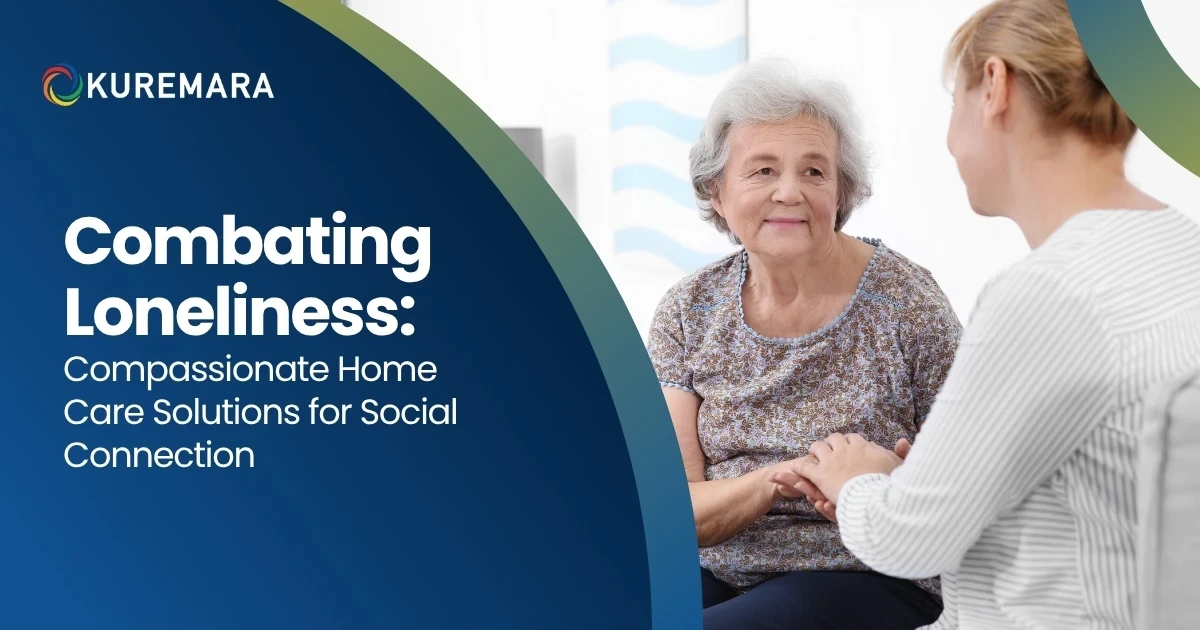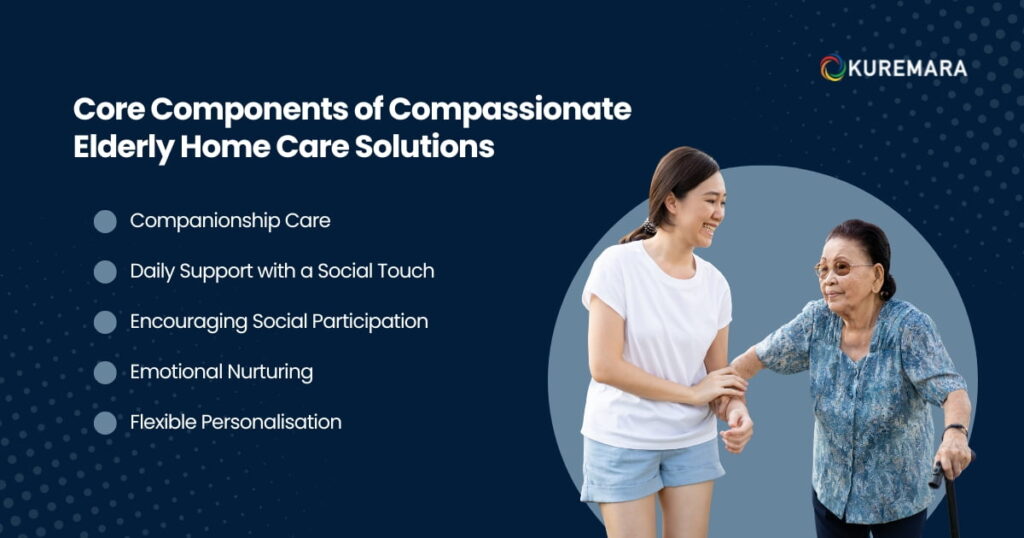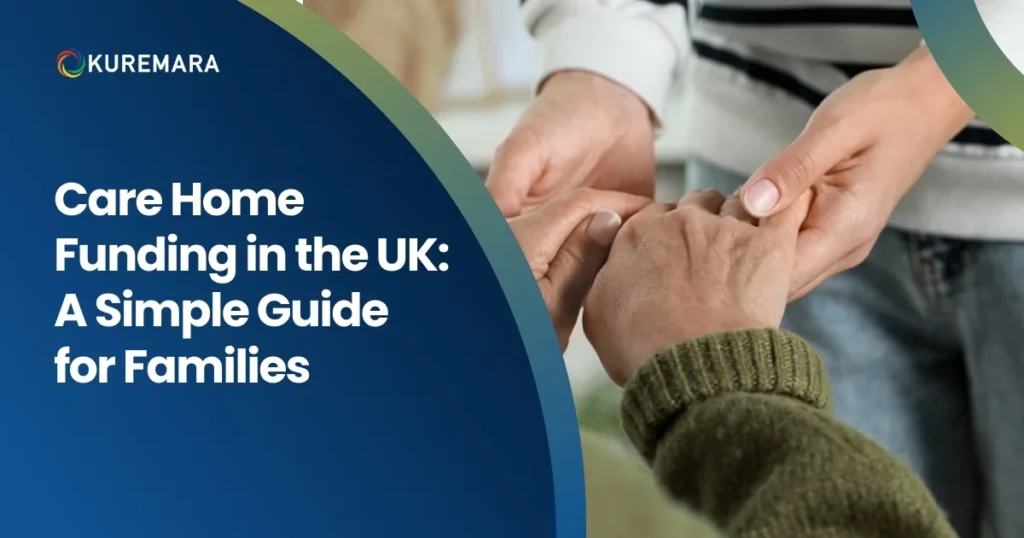
Loneliness is more than just an emotional experience, it’s a growing public health concern affecting thousands of older individuals. Whether due to retirement, loss of loved ones, or reduced mobility, the quiet moments of solitude can slowly turn into chronic isolation. But hope exists in the form of companionship care, a heart-led service focused on fostering meaningful human connection through professional support. In this article, we explore how personalised elderly home care solutions, like those offered by Kuremara, can transform lives, brighten days, and help individuals rediscover a sense of belonging.
The Hidden Toll of Loneliness Among the Elderly
As people age, social networks often shrink. Family members may live far away, long-time friends pass on, and health challenges can limit social participation. For many elderly individuals, this leads to feelings of being forgotten or invisible.
The effects of prolonged loneliness can be devastating:
- Increased risk of depression and anxiety
- Decline in physical health and immunity
- Cognitive decline, including memory loss
- Higher rates of hospital admissions and mortality
Yet despite the profound impact, loneliness remains under-recognised. It’s often mistaken for natural ageing or dismissed as “just a phase.” But loneliness isn’t inevitable, and it can be addressed with the right care.
Why Companionship Matters: The Human Side of Home Care
Loneliness isn’t simply about being alone, it’s about lacking meaningful interaction. That’s where companionship services play a powerful role. Unlike task-focused caregiving, companionship care focuses on emotional presence. It’s about spending time with someone who listens, shares stories, joins in hobbies, or simply offers a warm cup of tea and a kind smile.
Professional companions don’t just assist with routines, they build trust and genuine rapport over time. This relationship helps the elderly feel valued, respected, and seen. That emotional safety can reignite interest in life, improve self-esteem, and create joyful moments again.
Core Components of Compassionate Elderly Home Care Solutions
True companionship care goes beyond clinical checklists, it’s about restoring emotional warmth, trust, and the simple joy of connection. When delivered with empathy and consistency, it transforms the way older individuals experience daily life. Here are the key elements that define compassionate home care:

1. Companionship Care
At the heart of this approach is the power of conversation and presence. Caregivers become trusted friends, taking time to talk, listen, share stories, or enjoy a favourite hobby together. Whether it’s gardening, watching classic films, or playing board games, these shared moments help foster genuine emotional bonds and alleviate feelings of loneliness.
2. Daily Support with a Social Touch
Routine tasks like grocery shopping, preparing meals, or tidying up are opportunities for connection when done together. Rather than being passive recipients of care, individuals are engaged, encouraged, and supported, creating a healthier and more interactive daily rhythm.
3. Encouraging Social Participation
Staying connected with the wider community is vital for maintaining a sense of purpose and identity. Compassionate carers gently motivate individuals to attend social groups, art classes, or church gatherings, often accompanying them to help build confidence and reduce isolation.
4. Emotional Nurturing
Sometimes, what’s needed most is simply someone who listens. A consistent caregiver provides emotional stability, reassurance, and understanding. They help individuals navigate moments of grief, anxiety, or loneliness; offering comfort without judgment.
5. Flexible Personalisation
Every person has a unique history, personality, and pace. That’s why person-centred care is essential. Services are tailored to individual needs and preferences, whether that’s visiting at a preferred time, supporting a specific hobby, or simply understanding what matters most to them. This thoughtful personalisation helps older adults feel seen, respected, and in control.
How to Combat Loneliness: Steps for Families and Carers

Families often want to help, but may not know how to deal with loneliness effectively. Here are practical suggestions:
- Watch for signs: Withdrawal, sadness, or lack of interest in daily activities could indicate deeper emotional distress.
- Maintain regular contact: Phone calls and visits, no matter how short, can uplift someone’s day.
- Encourage hobbies: Shared interests spark connection and provide a sense of purpose.
- Involve professional support: Engaging trained caregivers who offer companionship services ensures consistency, empathy, and reliability.
Even small changes, like a daily walk with a friendly caregiver or joining a local group, can significantly improve someone’s quality of life.
The Kuremara Approach: Empowering Connection through Compassionate Care
At the heart of Kuremara’s service is one simple belief: no one should feel alone.
Kuremara provides dedicated companionship care that does more than check a task list, it connects people emotionally, mentally, and socially. Their experienced team recognises that loneliness is not always visible and approaches each person with warmth, attentiveness, and patience.
Here’s how Kuremara makes a difference:
- Personalised Companionship Visits:
Whether it’s a chat over tea or helping rediscover hobbies, caregivers are matched to clients based on compatibility and interests.
- In-Home Assistance with Empathy:
Daily tasks like meal prep, light cleaning, or medication reminders are delivered with kindness and conversation.
- Support for Social Engagement:
Kuremara helps individuals attend local community events, reconnect with friends, or explore new interests with the confidence of a caring companion.
- Flexible and Evolving Care Plans:
As needs change, so does the care. Kuremara tailors support to ensure it always meets emotional and social goals, not just physical ones.
- Respite for Family Members:
They also support families by offering respite care, ensuring loved ones get the social interaction they need while carers take a break.
Kuremara’s ethos is clear: care that feels like connection. Through their relationship-based services, they not only meet practical needs but also help rekindle joy, confidence, and dignity in daily life.
The Bigger Picture: Innovations Supporting Connection
While nothing replaces face-to-face interaction, technology can complement care in meaningful ways:
- Friendly voice assistants can offer gentle reminders or play music from the past.
- Video calls help maintain family connections across distances, especially with a caregiver’s assistance.
- Pet therapy or even robotic companions have proven calming and comforting effects for those with limited mobility.
- Community initiatives like befriending programs also bridge the gap between solitude and social connection.
When used alongside companionship for elderly, these tools can help maintain a healthy balance of independence and interaction.
Real-Life Reflections: A Future With Fewer Lonely Days
Imagine the smile on someone’s face when a familiar caregiver walks through the door, bringing not just care, but conversation, comfort, and laughter. These are the moments that transform lonely days into meaningful ones.
Companionship is not a luxury. It’s a need. And with the right support, it’s a need we can meet, with heart.
Conclusion
Loneliness may be common, but it doesn’t have to be permanent. Through compassionate companionship care, thoughtful planning, and the right emotional support, older individuals can enjoy deeper connections and improved well-being.
If you know someone who could benefit from greater companionship or emotional support, Kuremara’s compassionate team is ready to help. Their elderly home care solutions are designed to not just care, but connect.




